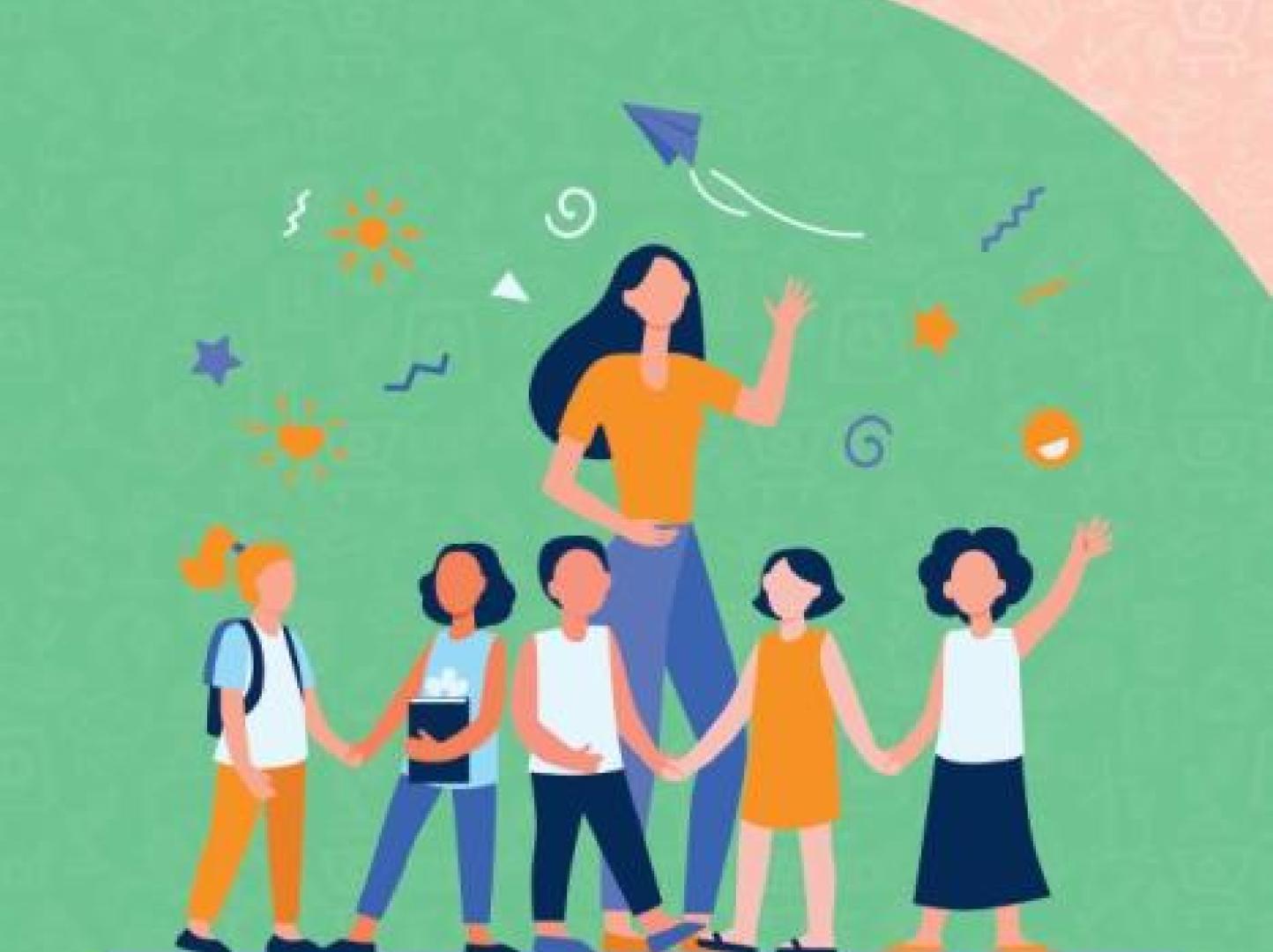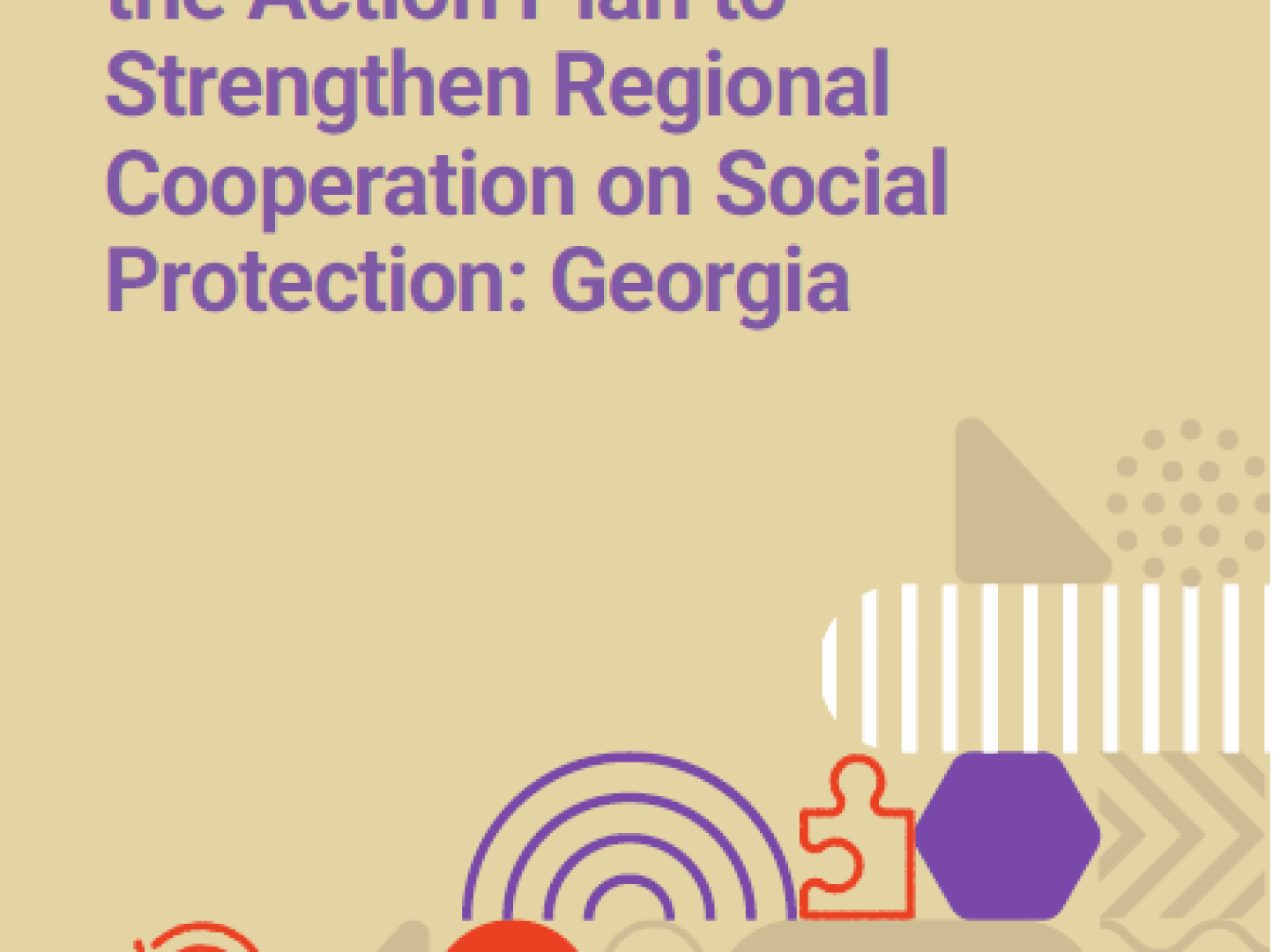Latest
The Sustainable Development Goals in Georgia
The Sustainable Development Goals are a global call to action to end poverty, protect the earth's environment and climate, and ensure that people everywhere can enjoy peace and prosperity. These are the goals the UN is working on in Georgia:
Story
25 July 2024
Didier Trebucq assumes duties as the United Nations Resident Coordinator in Georgia
On Thursday, Didier Trebucq, the new United Nations Resident Coordinator in Georgia, formally presented his credentials to the President of Georgia, H.E. Salome Zourabichvili.Mr. Trebucq expressed his appreciation to President Salome Zourabichvili for Georgia's enduring partnership with the United Nations and reiterated the UN's unwavering commitment to supporting the people of Georgia on the country’s sustainable development pathway. "I am deeply honored to lead the UN team in Georgia," he said. "I look forward to collaborating with our national and international partners to achieve the Sustainable Development Goals and build a just, sustainable and peaceful future for all, especially those most in need."Earlier today, Didier Trebucq presented copies of his credentials to Mr. Lasha Darsalia, First Deputy Minister of Foreign Affairs of Georgia.Photo: © MFA of GeorgiaThe United Nations Secretary-General António Guterres appointed Didier Trebucq of France as the United Nations Resident Coordinator in Georgia on 17 June with the host Government’s approval.Mr. Trebucq brings more than 24 years of experience in sustainable development, climate change, social cohesion, peace and development, crisis prevention and humanitarian action with the United Nations and International Organizations. He previously served as the UN Resident Coordinator for Barbados and the Eastern Caribbean states, covering ten countries and territories and leading a sub-regional team of more than 20 UN Agencies, Funds and Programmes. His extensive experience with the UN also includes serving as the UNDP Country Director in Brazil, the UNDP Deputy Resident Representative respectively in Peru and Guyana, and the Team Leader for Crisis Prevention and Recovery with UNDP India.Before joining the United Nations, he worked as Head of Delegation of the French Red Cross in Colombia and Ecuador, with Doctors Without Borders in Kyrgyzstan and Tajikistan, and the private sector in France. He holds a Master’s degree in Sustainable Development with a specialization in environmental economics from Imperial College London (UK), and a Maîtrise in Business Administration and Management from the Institut Français de Gestion (France).
1 of 2
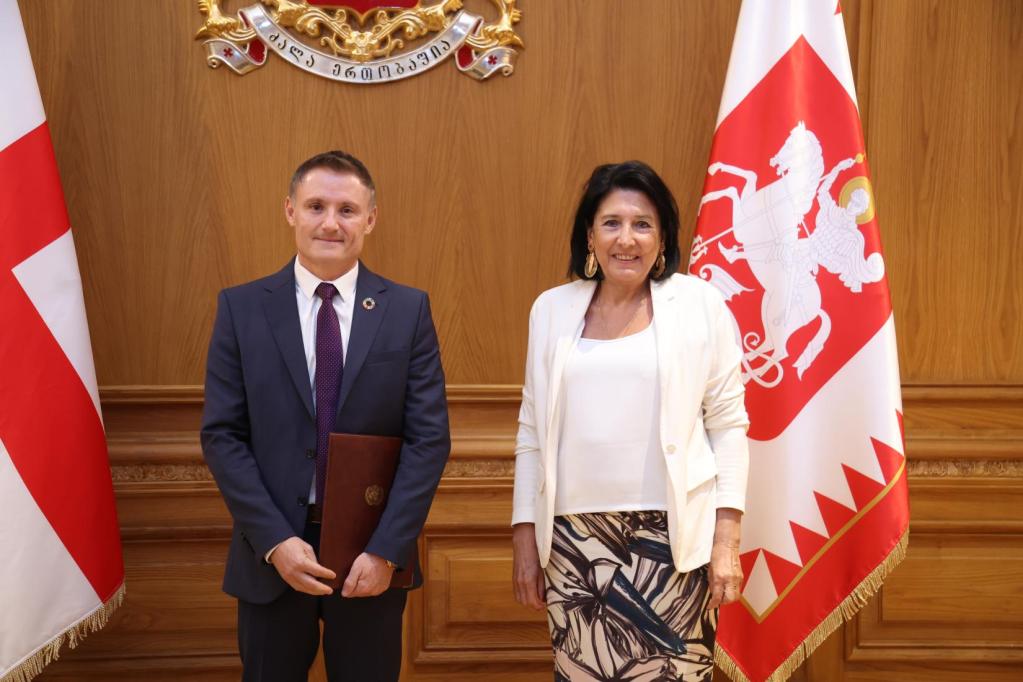
Publication
29 May 2024
Annual Results Report 2023
The 2023 Annual Results Report summarizes the progress made by the UN team in Georgia in 2023 on five key priority areas. This work aligns with the UN Sustainable Development Cooperation Framework for 2021-2025.A collective effort by 21 UN entities in Georgia is focused on achieving the Sustainable Development Goals and promoting greater well-being, capabilities, and social equality for all Georgians.This report details the UN's strengthened partnerships with the Georgian government and various stakeholders. It also highlights the UN's achievements in resource mobilization and expenditure. The report concludes by outlining the UN's priorities for 2024.
1 of 2
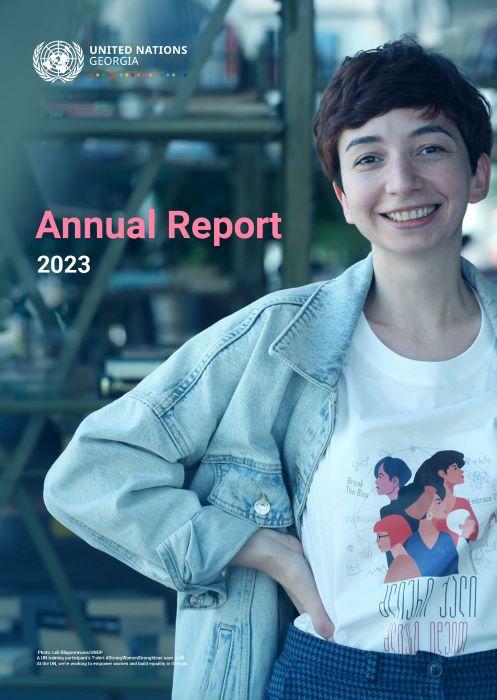
Story
16 April 2024
Women Breathe New Life into Communities Affected by Conflict
The village of Perevi is nestled in Georgia’s Shida Kartli region along the Administrative Boundary Line with the Tskhinvali Region/South Ossetia. Historically, Perevi thrived on agriculture, particularly animal farming and beekeeping. However, its fortunes took a downturn following the armed conflict in 2008.As movement restrictions were imposed, Perevi residents lost access to vital summer pastures. Their livelihoods were disrupted leaving the community with limited prospects. Many Perevians left their village seeking opportunities in the cities or abroad. Despite these challenges, 150 families still live in Perevi, grappling with social and economic hurdles.The European Union and UNDP, through the EU4Dialogue project, assist Perevi residents in revitalizing their village. Targeted grants and other types of support, implemented in partnership with the civil society organization 'Regional Development Support Centre', reached out to over 100 people, offering resources they need to kickstart rural entrepreneurship.Perevi is just one of the conflict-affected villages where the EU and UNDP work hand-in-hand with civil society organizations, municipalities, and local communities bolstering economic and social resilience and creating opportunities for entrepreneurship and income generation.Throughout 2023 and 2024, this support benefited up to 1,500 internally displaced and conflict-affected women across Georgia.Photo: UNDP/Gela BedianashviliA New Path to Prosperity42-year-old Tsitsino Sisvadze, a dedicated nurse at Perevi Public School, pioneers alternative agriculture practices by transforming her hobby into a sustainable enterprise. With the grant support from the EU4Dialogue project, Tsitsino purchased wooden logs, mushroom mycelium, and a drip irrigation system to set up a mushroom farm in her backyard. As snow melts and spring approaches, she eagerly anticipates her first harvest. “In Georgia, women still face barriers to economic activities. I wish to address every woman who wants to start a business. Nothing can stand in your way. No “I am a woman, I can’t do it”. We shall take risks and do our best. I believe that hard work bears fruit sooner or later”, says Tsitsino.Photo: UNDP/Gela BedianashviliOne Loaf at a TimeNana Kapanadze, a 46-year-old village doctor, has recently taken on a new role as a baker. For her, bread baking isn't just a pastime; it's a response to a critical need within her community. In Perevi, access to freshly baked bread is a rare luxury, as distribution companies only deliver bread from the administrative centre once a week. The alternative? Taking matters into one's own hands and baking bread at home.With essential support from the EU4Dialogue's grant programme, Nana invested in professional equipment and established a small bakery, which quickly gained popularity among Perevi residents. As the delicious smell of freshly baked bread permeates the village, Nana’s bakery brings hope for a better future.“If my bakery keeps growing, I can hire more people, creating jobs for my fellow villagers. My wish is to teach others how to bake great bread. The grant support I received is an inspiration for other women. They call me ‘smart’ and want to follow my example”, shares Nana.Photo: UNDP/Gela BedianashviliTimeless SuccessMeet Lida Enukidze, 70, whose inspiring story proves that it’s never too late to chase your dreams. Lida represents an unyielding spirit of women who defy societal norms and surpass expectations. Her sewing journey began in her youth when she mastered the craft at a vocational school. After years of working in a sewing workshop, Lida joined forces with fellow villager, Mzia Beridze, to establish a sewing business. Over the past decade, they've catered to both individual and commercial clients.Thanks to the EU and UNDP support, Lida's sewing salon received a boost with new equipment, including a multipurpose sewing machine, electric scissors, and professional iron. This investment enabled a modest village enterprise to undertake larger orders, such as crafting essential bed linen for regional hospitals.“Rural women encounter many challenges that encourage us to find solutions and grow. What we need is inspiration and positive examples. We must take care of ourselves because no one else will,” shares Lida. “This project showed me that I can be an inspiration for other women in my village.”Photo: UNDP/Gela BedianashviliTaking FlightKhatuna Bregvadze is a 45-year-old librarian turned entrepreneur. Her story serves as an example of women’s resilience in the face of economic and social hurdles.Like many Perevi residents, Khatuna has to supplement her professional work with agricultural activities to make a living. For the past eight years, poultry farming has been her lifeline, enabling her to make ends meet.Through the EU4Dialogue’s grant programme, Khatuna seized the opportunity to expand her small hatchery by acquiring two incubators for hatching eggs and an electricity generator to regulate the energy supply. With this support, she now supplies fresh poultry to the village, while also boosting egg sales.“Poultry farming is more than just a job and income. It's my way of showing that positive change is possible, even in our small and poor village.”Background Information:EU4Dialogue: Support to Conflict Transformation in the South Caucasus and the Republic of Moldova is a joint initiative of the EU and UNDP under the broader EU4Dialogue programme. The project partners with local civil society organizations and grassroots groups to improve socio-economic conditions for people, build livelihoods, drive progress toward gender equality, promote youth engagement and support the peaceful transformation of conflict.Disclaimer:This story was produced with the financial support of the European Union and UNDP under the EU4Dialogue project. Its contents do not necessarily reflect the views of the European Union and UNDP.
1 of 5
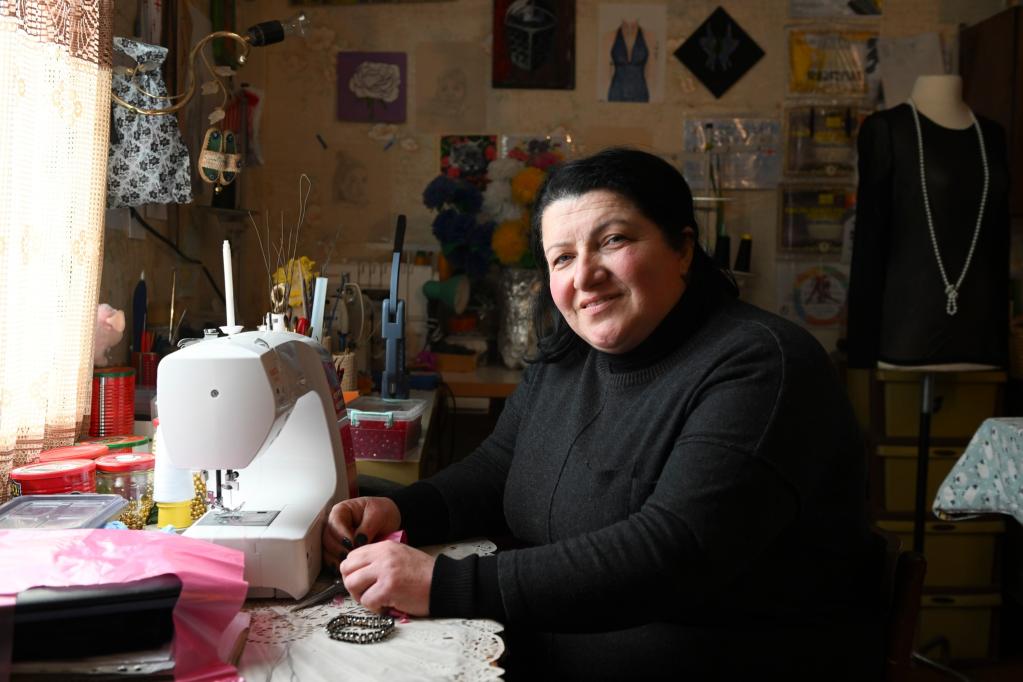
Story
02 March 2024
Microcredit helps Ukrainian refugees start businesses in Georgia
While strolling through the city centre of Batumi, a port city on Georgia’s Black Sea coast, a small Ukrainian café is sure to catch your eye. Adorned with colourful murals and filled with Ukrainian symbols and ornaments, “Like at Home” is a welcoming space that has quickly become a favourite spot for both local and refugee families. Owner Irina Dotsenko, a 67-year-old Ukrainian from Kharkiv, describes it as the "Ukrainian soul in Georgia". The name is based on the heart-felt compliments of Ukrainian customers reminded of dishes they used to enjoy back home such as Borsch, Holubsti and Deruny. Irina believes it to be fitting, as she brought with her the cherished recipes she, her mother and her grandmother used to prepare in Ukraine before Russia’s full-scale invasion of the country in 2022. Unable to cook for her family, who remain in Ukraine, she channels her care into cooking for other refugees from Ukraine, as well as for the local community. “The pain of Ukraine is my pain,” she says. “But it’s a nighttime pain. During the day, my mind is occupied with the people – their worries, and the hustle for work.” Irina talks to a customer at her café, which has become a favourite in Batumi with Ukrainians hankering for a taste of home, and with locals.© UNHCR/Kakha MshvidobadzeAmidst the chaos of full-scale war and the unprecedented numbers of Ukrainian refugees arriving to Georgia, Irina initially organized food banks to support those in need. But soon she recognized the employment challenges faced by many Ukrainians, and she began hiring some of them. Now, 30 out of 44 of her employees are Ukrainian refugees, while the rest are made up of a wide range of nationalities, including Georgians.A financial product designed for refugees But her small café with its 12 tables needed only half that number of staff and she was soon faced with a dilemma. “I take responsibility for each person working with me – no exceptions,” she says. “The simplest solution would be let people go, but that’s not a viable solution.” Instead, she decided to open a second café. With limited financial resources of her own, she stumbled across an advertisement for Crystal, a microfinance institution in Georgia that had recently launched a programme specially designed to assist refugees from Ukraine. Irina promptly applied for a micro-credit loan, which she received within three days following a meeting with Crystal. The additional finance transformed her aspirations into reality, enabling her to purchase the necessary kitchen appliances and equipment to open the second café in December 2023. Of some 245,000 refugees from Ukraine who have crossed the border into Georgia since February 2022, about 26,600 Ukrainians remain in Georgia today, many of them from heavily war-affected areas in the east of Ukraine. They can access healthcare and education, as well as cash assistance for the most vulnerable, but finding work and affordable housing can be challenging. Since launching in 2022, Crystal’s programme for Ukrainians, which includes business mentoring services in addition to micro-finance, has helped over 30 Ukrainian entrepreneurs like Irina to support themselves and other refugees. Tackling stereotypesThe founder and chairman of Crystal, Archil Bakuradze believes that providing job opportunities and business development is the most effective way to support refugees. An internally displaced person from Abkhazia, the breakaway region of Georgia, he understands the importance of solidarity and support in rebuilding lives. His company was established 25 years ago by a group of young people displaced from Abkhazia. It is now the largest microfinance institution in Georgia. Irina talks to her employees ahead of the opening of the second "Like at Home" café.© UNHCR/Kakha MshvidobadzeIrina decorating her newly opened café with Ukrainian symbols.© UNHCR/Kakha Mshvidobadze"It is very important to tackle the stereotype that refugees may be a problem or be risky customers. We know ourselves that most refugees are talented, economically active people, and displacement helps mobilize them even more than usual,” he says. “Globally, the idea of supporting the financial inclusion of refugees is a sensible policy, and we would encourage any other financial institution to think about having such programmes for refugees." Following discussions with UNHCR, the UN Refugee Agency, his company will soon be extending its financial programmes to refugees of different nationalities living in Georgia, enabling them to start and expand their businesses. “This type of financial assistance is crucial for individuals, and it contributes significantly to the country's economy,” says Irina, as she opens the doors to her second "Like at Home" café in Batumi. “We've also become useful to Georgia.” "I take responsibility for each person working with me – no exceptions."Irina Dotsenko
1 of 5
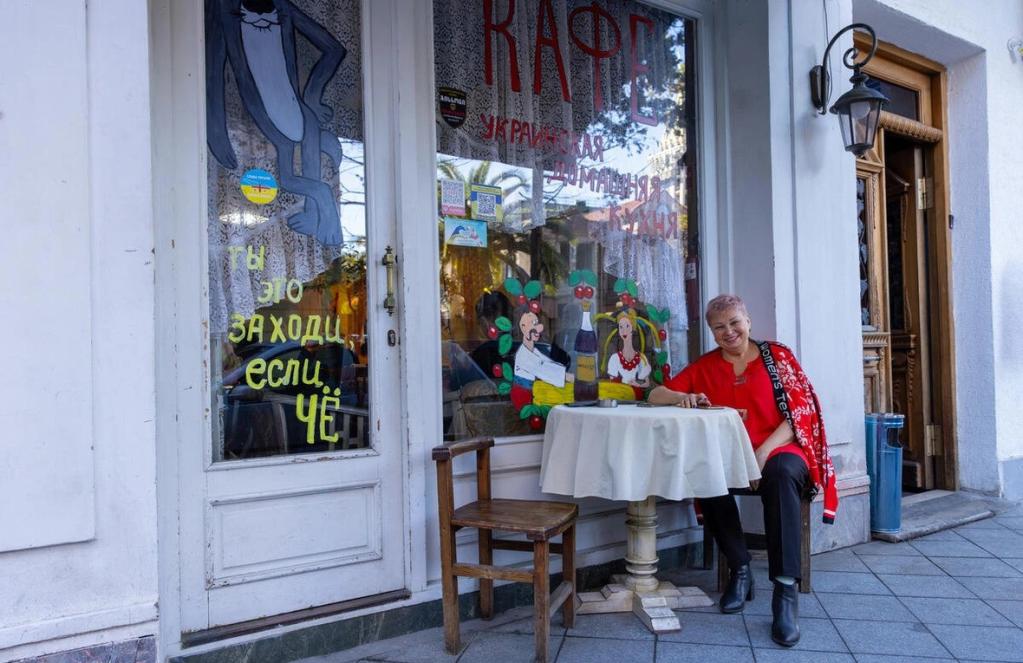
Story
09 February 2024
Suramula: How to Survive a Flood
Gameplay Rooted in Reality
Roaring water floods the streets. A quest for safety begins! Is it reality or a game?
For 15-year-old Salome Noniashvili from Georgia's Kaspi municipality, it's both. Co-author of the online game Suramula, Salome harnesses the power of play to teach people how to navigate climate disasters.
Salome's hometown faces annual climate challenges, with the Suramula River transforming into a destructive force. Drawing from real events, the game incorporates footage and photos from past floods. In their attempts to flee, players encounter challenges mirroring the struggles of real-life scenarios.
"To escape the flood, players need to climb high buildings. As they go up, they face new challenges, creating an immersive gaming experience."
Salome Noniashvili, Young Climate Ambassador and co-author of the Suramula online game
Accessible through the gaming portal Roblox, the Suramula game transcends virtual boundaries, driving a climate awareness campaign aimed at the youth in Kaspi Municipality. Salome and her friends organized information meetings and seminars, engaging over 50 young participants. These events were focused on disaster management, community resilience, and green entrepreneurship, fostering an understanding of environmental challenges and inspiring youth to actively contribute to green solutions.
Photo: UNDP Georgia/Giorgi Shengelia
From Camp to Action: Young Climate Ambassadors
In the summer of 2023, Salome Noniashvili's visionary initiatives took root at the "Climate Ambassadors" educational youth camp. Alongside 50 bright and keen climate activists from all corners of Georgia, Salome thrived in a friendly environment, offering young minds a platform to learn, connect, and refine their leadership and entrepreneurial skills.
The transformative experience left camp participants brimming with newfound knowledge about environmental challenges and a passionate determination to shape a sustainable future. Many, including Salome, embarked on projects addressing environmental issues in their home regions.
"The summer camp for Young Climate Ambassadors is the realization of my values, experiences, and the knowledge I eagerly sought."
Salome Noniashvili, Young Climate Ambassador and co-author of the Suramula online game
Nurturing Environmental Champions
The Climate Ambassadors camp is a joint initiative of UNDP and the Environmental Information and Education Centre of Georgia’s Ministry of Environmental Protection and Agriculture. The camp aims to raise climate awareness across the country, engaging local communities and youth in national climate action.
In 2022 and 2023, the camp welcomed 110 young climate activists, nurturing a generation of environmental champions.
Through innovative initiatives like the Suramula game, young leaders like Salome Noniashvili are actively contributing to a sustainable and resilient future.
This pivotal work is part of the UNDP’s broader climate programme, supported by the Green Climate Fund, and the governments of Georgia, Sweden, and Switzerland.
1 of 5
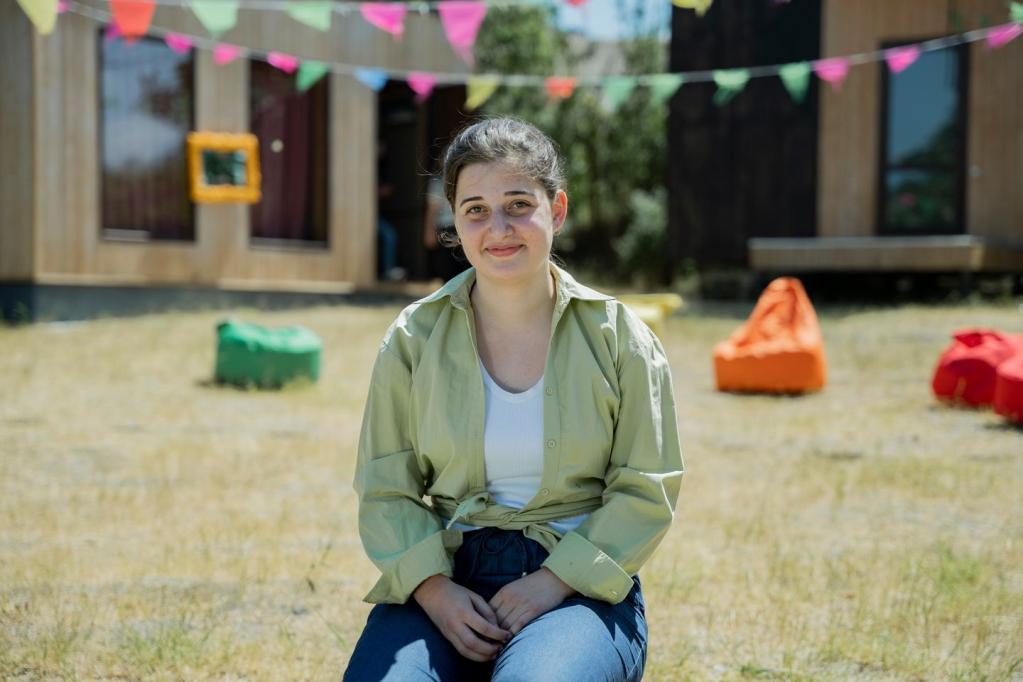
Story
24 January 2024
Telemedicine: Bridging a Healthcare Gap in Georgia
As challenging as the COVID-19 pandemic was, it brought forth some positive transformations in health services. When the pandemic hit Georgia, with forced lockdowns and overwhelmed hospitals, telemedicine had an opportunity to grow remarkably. Initially driven by necessity, today, the use of telecommunications to provide healthcare remotely has proven extremely valuable in reaching patients in Georgia’s remote and mountainous regions, roughly 40 per cent of the population.
In rural areas with limited healthcare infrastructure and a shortage of medical professionals, residents often face significant challenges in accessing timely and comprehensive care. This is exacerbated by long distances, harsh and unpredictable weather, and limited transportation.
Under my leadership, as the UN Resident Coordinator in Georgia, and in collaboration with the World Health Organization (WHO), the UN Population Fund (UNFPA), the UN Children's Fund (UNICEF), and the UN Office for Project Services (UNOPS), the UN in Georgia has partnered with the Ministry of Health to connect patients to primary health care, overcoming significant geographical barriers. Successful negotiations with the European Union Delegation, which I facilitated, resulted in the approval and launch of a €4.7 million (US$ 5 million) telemedicine initiative.
Complementing other UN health efforts, the programme has provided over 1,700 medical furniture and devices, nearly 9,200 medical supplies, and training on the usage and maintenance of equipment to 400 ambulatory doctors across 55 municipalities in Georgia. We continue to support medical personnel in enhancing surveillance, data management, and contact tracing capabilities, including through the implementation of the outbreak investigation tool Go.Data, for field data collection during public health emergencies.
Prioritizing critical infrastructure, the country's digital transformation has enabled patients to consult with healthcare providers and raise their awareness about health-related issues from their own homes. This advancement allows doctors to prescribe medicines, obtain additional expertise, enter immunization data, conduct ante-natal care consultations with expectant mothers, and compile reports.
Improving the Continuity of Care
The scope and potential for telemedicine to play a significant role in Georgia is expansive. Georgia has a significant burden of non-communicable diseases (NCDs), which are responsible for 88% of all deaths in the country. Various factors, such as a lack of preventive measures, poor early detection services, a lack of specialized healthcare services in rural areas and inadequate control of chronic diseases are among the main reasons for this. Virtual counselling and digital health solutions have emerged as a solution to expand access to healthcare for these patients.
With the support of the UN’ s programme, regular virtual check-ins with nurses, doctors and specialists help monitor chronic conditions, identify potential health concerns early, and ensure that patients receive effective ongoing care. In one such instance, more than 3,000 women in Georgia have now registered for cervical, breast and thyroid cancer screening, with the help of their family doctors.
Remote child development services have also been introduced in approximately 50 rural clinics throughout Georgia, providing telecare platforms, medical devices, and ICT equipment. Digital telemedicine solutions make routine health checks for children and early childhood intervention specialists more accessible and affordable. Online antenatal care visits are also available for pregnant women with special needs or from remote areas.
We are also supporting the establishment of virtual learning networks, which connect rural family doctors with professionals, such as developmental pediatricians, child psychologists, and youth psychiatrists to mentor and guide community practitioners and ensure the delivery of high-quality services.
Capacity building of doctors and nurses
Today, doctors have access to the latest professional information through a common online information platform based at the Emergency Coordination and Emergency Assistance Center of Georgia and through the Continuous Medical Education platform based at Tbilisi State Medical University. In this project, the WHO has formulated telemedicine clinical guidance and care pathways, outlining the requirements for running teleconsultation services associated with priority non-communicable diseases. Rural doctors are also being trained to conduct online consultations using digital medical devices, resulting in advanced competencies in telemedicine and increased skills in using digital solutions.
Digital Future for Healthcare
The UN's telemedicine initiative is part of our broader support for Georgia's health agenda, aligning with the commitment to SDG 3.8 for universal health coverage. Looking ahead, we believe telemedicine can facilitate universal access to a sustainable primary healthcare system, regardless of location, and at minimal cost, utilizing digital solutions to bridge the healthcare gap for the most vulnerable communities.
At the 2023 SDG Summit, UN Secretary-General Guterres called for the prioritization of six key areas to accelerate the SDGs, including digital connectivity. We need to now lift the Summit’s Political Declaration off the page and reaffirm our unwavering commitment to inclusive digital transformation and a healthier future for all.
-----
This blog was written by the UN Resident Coordinator in Georgia, Ms. Sabine Machl.
1 of 5
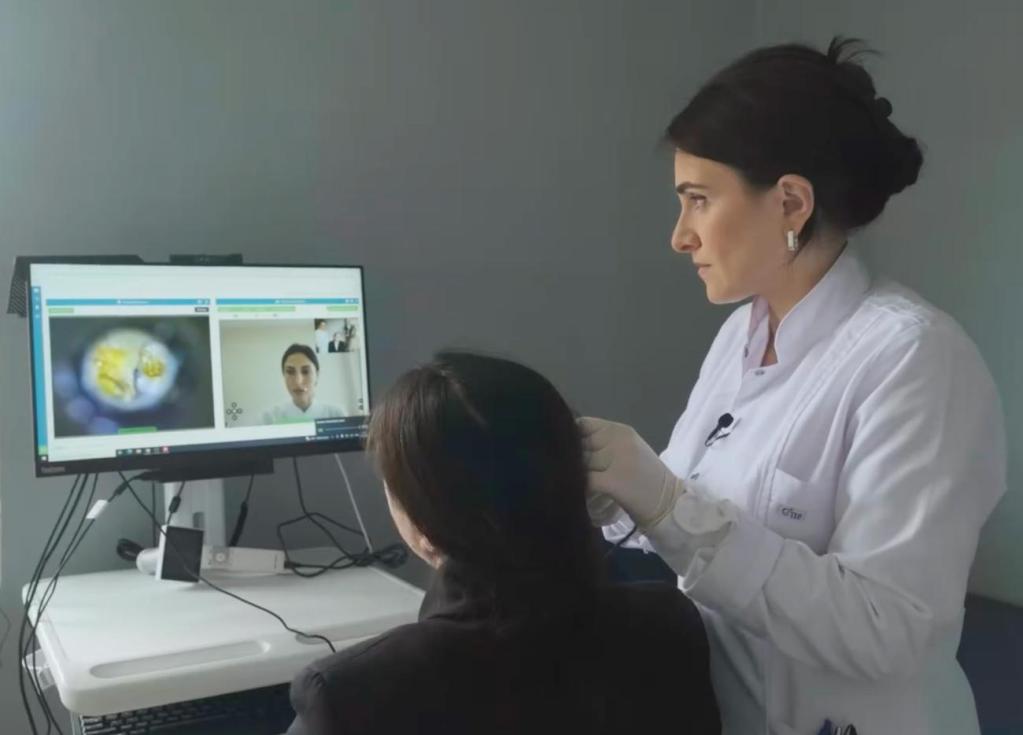
Story
18 January 2024
Empowering Lives
8-year-old twins, Ani and Mari, play with their cat “Piso” in the yard while chatting with the local municipality social worker, Ia Ekhvaia – a frequent visitor to their home. The girls show Ia their recent drawings and tell her their plans for the future. Mari wants to become a veterinarian and Ani, a fashion designer. Ia smiles and encourages the girls while checking in with their mother if there is anything the family needs at this point. This family of seven, refugees from Abkhazia now living in the village Rukhi, has been in the focus of the municipality due to the grave living conditions and severe financial problems that they faced.
“We were constantly frustrated, the state support we received was only enough for some food and basic goods, but the children need so much more as they grow up,” says Gulnazi, the 43-year-old mother of Gocha, 13, Salome, 11, Nini, 9, and the twins.
Practical skill-based intervention programmes from the municipality of Zugdidi helped the parents find stable work, complementing and in the long-term, replacing the support provided by the government. The father, who had been unemployed for over a decade due to health issues, secured a position within the municipality, while the mother found employment in the local kindergarten. The municipality supported the children in enrolling in after-school classes where they learn English, since all of them were interested and gifted in languages.
Nino Skhulukhia, head of Zugdidi municipality's Social Department, emphasizes the significance of a pragmatic, holistic approach in addressing vulnerability. "You cannot be too emotional or else you will lose all professional objectiveness; you cannot be at the center of the problem," she underscores.
UNICEF/Geo-2023/Gabechava
Nino speaks about the strategic shift in programming which she experienced as a result of the new partnership initiative with UNICEF, the National Association of Local Authorities of Georgia (NALA), and 18 municipalities in Georgia supported by the European Union. The aim of the initiative is to enhance social programming to reach the most vulnerable children and families, and to guide them towards self-reliance.
The new methodology was introduced in the municipalities to focus on needs assessment for entire families, rather than solely focusing on children or individual parents. The new programming led to improved outreach based on field research, surveys, focus groups and interviews. The research found unmet needs of children and families and weaknesses in existing outreach-based programmes, resulting in many families being unaware of available assistance, even for basic medical needs. Utilizing this new methodology of needs assessment, social workers identified families' most pressing necessities and are now assisting them in accessing the required support. The improved programming guarantees evidence based social planning and better focus on children and their families.
“Before, we did not have such methodology. We did not know how to do proper needs analysis,” says Nino, “and this prevented us from on one hand, to have an objective view of a case, and on the other hand, the needs assessment showed us that child deprivation goes beyond financial needs, thus it cannot be met with only financial support”.
UNICEF/Geo-2023/Gabechava
Gulnazi, 43-year mother of 5 children with her family
The programming goes beyond one-time financial assistance by developing comprehensive support programmes and connecting families with available services based on their needs, addressing employment opportunities, incorporating education, language, and mental health support. Direct outcomes of collaborative efforts included: transportation for school children, programmes for children with autism spectrum disorders, and English language lessons. This multifaceted approach aims to uplift families, fostering self-reliance and breaking the cycle of poverty and vulnerability.
UNICEF/Geo-2023/Gabechava
Social Worker Ia Ekhvaia talking with the family
Recently, the family of Ani and Mari stepped into their new home, built by the Danish Refugee Council. The house marked a turning point for their family, illustrating the positive impact of the collaborative efforts of the municipality, the national government, and the international society.
“Being refugees of war and socially vulnerable, we have always been dependent on state support,” says Gulnazi, “but now, with this other kind of attention – to the needs of my children, to my needs, I feel seen. I feel more optimistic for the future of my children. I am hopeful that with the knowledge and skills they are gaining now, they will grow up to be independent and successful people”.
The article was produced with the assistance of the European Union. Its contents are the sole responsibility of the authors and do not necessarily reflect the views of the European Union.
1 of 5
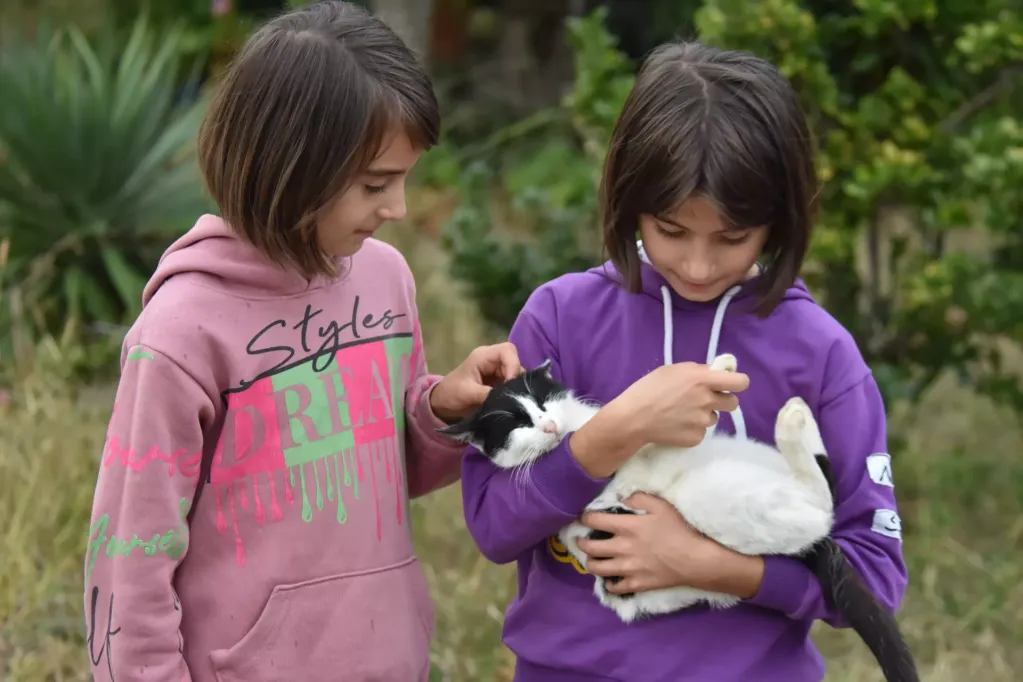
Press Release
14 July 2024
UN SG's message on the occasion of World Youth Skills Day 2024
The future of humanity and our planet depends on young people. But it also depends on ensuring they have the skills to tackle today’s challenges and shape a more peaceful tomorrow. We know there is a clear link between countries that enjoy high levels of peace, spending on education, and school completion rates. Yet today, almost a quarter of the world’s youth are not in education, employment, or training – with that figure more than twice as high for young women.Meanwhile the financing gap for education in low and middle-income countries stands at a massive 100 billion dollars a year.This year’s World Skills Day shines a spotlight on skills for peace and sustainable development. Around the world, young people are already working to build safer and stronger communities. They can make an even bigger difference for our shared future with training for the burgeoning green and digital economies, education to help break the cycle of hate speech and misinformation, tools to enhance mediation and dialogue, and so much more. Today, and every day, let’s work to transform education.And let’s ensure that youth have what they need to build skills for shaping a more peaceful, sustainable future for all.
1 of 5
Press Release
11 July 2024
The Secretary-General's Message for World Population Day
This year marks the thirtieth anniversary of the International Conference on Population and Development (ICPD) Programme of Action. It must also be the year we resolve to accelerate efforts and investments to turn its promises into a reality. Central to the ICPD Programme of Action is the recognition that women’s sexual and reproductive health and reproductive rights are cornerstones of sustainable development. In the decades since it was adopted, we have made progress. More women than ever have access to modern contraception. Maternal deaths have fallen thirty-four per cent since the year 2000. The women’s movements and civil society have been critical to driving change. But progress has been unequal and unsteady. It is outrageous that well into the 21st century, around 800 women die needlessly every day in pregnancy and childbirth – the vast majority in developing countries. And in some places, legislative advances in tackling vital issues such as female genital mutilation risk going into reverse. As the theme of this year’s World Population Day reminds us, investing in data collection is important to understanding problems, tailoring solutions, and driving progress. So is finance. I urge countries to make the most of the Summit of the Future this year to unleash affordable capital for sustainable development. Let’s deliver on the ICPD Programme of Action for everyone, everywhere.
1 of 5
Press Release
08 July 2024
The 2024 SDG Report
The 2024 Sustainable Development Goals Report highlighted that nearly half the 17 targets are showing minimal or moderate progress, while over a one-third are stalled or going in reverse, since they were adopted by UN Member States back in 2015 to bring peace and prosperity for people and the planet. “This report is known as the annual SDG report card and it shows the world is getting a failing grade,” UN Secretary-General António Guterres said at the press conference to launch the report. “The takeaway is simple – our failure to secure peace, to confront climate change and to boost international finance is undermining development. We must accelerate action for the Sustainable Development Goals, and we don’t have a moment to lose,” he stressed. The Report identified the lingering effects of the COVID-19 pandemic, escalating conflicts, geopolitical tensions and worsening climate chaos as major obstacles to progress. It noted that an additional 23 million people were pushed into extreme poverty and over 100 million more were suffering from hunger in 2022 compared to 2019, while the number of civilian deaths in armed conflict skyrocketed last year. 2023 was also the warmest on record, with global temperatures nearing the critical 1.5°C threshold.The SDG Report highlights stark economic challenges, with per-capita gross domestic product (GDP) growth in half of the world’s most vulnerable nations slower than in advanced economies. Nearly 60 per cent of countries faced abnormally high food prices in 2022, exacerbating hunger and food insecurity. At the same time, despite global unemployment reaching a historic low of five per cent in 2023, many obstacles to achieving decent work across all societies persist. However, there are positive developments in renewable energy, which expanded at a rate of 8.1 per cent annually over the past five years. Technological advancements also saw significant strides, with mobile broadband accessibility (3G or higher) increasing to 95 per cent of the world’s population from 78 per cent in 2015.The report comes ahead of the High-Level Political Forum on Sustainable Development (HLPF), taking place at the UN Headquarters, in New York, from 8 to 17 July. Under the auspices of the Economic and Social Council (ECOSOC), the Forum will review global progress towards Goal 1 on ending poverty, Goal 2 on zero hunger, Goal 13 on climate action, Goal 16 on peaceful and inclusive societies, and Goal 17 on means of implementation. In addition, the upcoming Summit of the Future in September will be pivotal for realigning efforts towards achieving the Goals. The Summit aims to address the debt crisis affecting many developing countries and the urgent need to reform international financial architecture.For more information, please visit: https://unstats.un.org/sdgs/report/2024/Source: UN News
1 of 5
Press Release
27 June 2024
Georgia failed to protect children against violence and abuse in church-run orphanage, UN committee finds
Georgia violated its child rights obligations by failing to take immediate intervention to address the frequent physical and psychological abuse of children who lived in a close-type orphanage run by the Georgian Orthodox Church, the UN Child Rights Committee has found. The Committee issued a Decision today after reviewing a complaint filed on behalf of 57 children residing in Ninotsminda St Nino Children’s Boarding School at the time of submission. Of these 57 children, the individual cases of M.L. and L.K. revealed the extent of abuse and mistreatment. Born in 2008, M.L. was placed in Ninotsminda St Nino from the age of three to thirteen where she suffered harsh punishments for bedwetting. Caregivers would often instruct older children to “discipline” her and other children by hitting them with sticks or hands. She was also compelled to take psychotic medicines when she was 11. Another child, L.K., born in 2003, faced similar hardships, including inadequate food, poor hygiene, and restricted movement. Her brother, who had disabilities, also experienced neglect and abuse. “Children deprived of their family environment are entitled to special protection and assistance from the State, which is their custodian,” Committee member Benoit Van Keirsbilck said, adding that the Georgian government is thus held accountable for what happened behind the closed doors of an orphanage or any other similar institutions. Ninotsminda St. Nino Children’s Boarding School is a residential facility for orphans and children without parental care. Its dire condition was first identified by the Public Defender’s Office of Georgia in a 2015 report. The report pointed out frequent psychological and physical bullying among children, as well as corporal punishments by caregivers such as prostrations, skipping meals, confinement, and forced crawling. Nonetheless, the orphanage was granted a care license in 2016 after the new edition of the Law of Georgia on Licensing of Educational Activities took effect.The Public Defender’s Office issued a follow-up report in 2018, underlying the systemic problems within the orphanage and the urgent need for oversight and improvement in the care of the children. For almost a year since June 2020, the Public Defender’s Office was repeatedly denied access to the orphanage.Noting that the authorities had not been able to monitor children at the orphanage, NGO Partnership for Human Rights first took the matter to various courts in Tbilisi and eventually brought the case to the Committee in May 2021.The Committee immediately granted interim measures in favour of 57 children requesting access for the Public Defender’s Office to the orphanage.One month later, the Public Defender's Office was allowed to enter to undertake a comprehensive assessment, which resulted in the transfer of 27 children to alternative care. As of November 2021, 15 children, including at least one with a disability, still lived at the orphanage, although the issues raised remained unresolved. After reviewing the complaint, the Committee found that Georgia had failed to protect the children in Ninotsminda St Nino Children’s Boarding School, who were deprived of their family environment and some of whom had disabilities, from violence and abuse, in violation of their obligations under the Convention on the Rights of the Child.The Committee requested Georgia to provide effective reparation to the child victims, including adequate compensation and rehabilitation, a public apology, reassessment of those still under State care, and independent investigation and prosecution of those responsible. Reparation measures should be coordinated with the child victims to incorporate their views.“We are appalled at the situation these children deprived of their families, some of them from a very young age and throughout their childhood. The treatment they received will have life-long consequences on their development” Van Keirsbilck said. “Regular and independent monitoring of institutions where children reside is essential to ensure that the treatment and living conditions comply with child rights standards and that these violations are not repeated in the future,” he added.ENDSFor more information and media enquiry, please contact:
Safa Msehli at safa.msehli@un.org or
Vivian Kwok at vivian.kwok@un,org
Background:
The Committee on the Rights of the Child monitors States parties' adherence to the Convention on the Rights of the Child and its Optional Protocols on involvement of children in armed conflict, and on sale of children, child prostitution and child pornography. The Convention to date has 196 States parties. The Committee is made up of 18 members who are independent human rights experts drawn from around the world, who serve in their personal capacity and not as representatives of States parties. The Optional Protocol to the Convention on the Rights of the Child on a communications procedure (OPIC-CRC) allows the Committee to receive and examine complaints by individuals or groups of individuals claiming to be victims of a violation of the rights of the child by States that have ratified the Optional Protocol. To date, 52 States, have ratified or acceded to the OPIC-CRC. The Committee’s views and decisions on individual communications are an independent assessment of States’ compliance with their human rights obligations under the Convention and its two substantive optional protocols. Learn more with our videos on the Treaty Body system and the Child Rights Committee!
Follow the UN Treaty Bodies on social media!
We are on Twitter @UNTreatyBodies
Safa Msehli at safa.msehli@un.org or
Vivian Kwok at vivian.kwok@un,org
Background:
The Committee on the Rights of the Child monitors States parties' adherence to the Convention on the Rights of the Child and its Optional Protocols on involvement of children in armed conflict, and on sale of children, child prostitution and child pornography. The Convention to date has 196 States parties. The Committee is made up of 18 members who are independent human rights experts drawn from around the world, who serve in their personal capacity and not as representatives of States parties. The Optional Protocol to the Convention on the Rights of the Child on a communications procedure (OPIC-CRC) allows the Committee to receive and examine complaints by individuals or groups of individuals claiming to be victims of a violation of the rights of the child by States that have ratified the Optional Protocol. To date, 52 States, have ratified or acceded to the OPIC-CRC. The Committee’s views and decisions on individual communications are an independent assessment of States’ compliance with their human rights obligations under the Convention and its two substantive optional protocols. Learn more with our videos on the Treaty Body system and the Child Rights Committee!
Follow the UN Treaty Bodies on social media!
We are on Twitter @UNTreatyBodies
1 of 5
Press Release
17 June 2024
Secretary-General appoints Didier Trebucq of France as the United Nations Resident Coordinator in Georgia
United Nations Secretary-General António Guterres has appointed Didier Trebucq of France as the United Nations Resident Coordinator in Georgia, with the host Government’s approval, starting on 17 June.Mr. Trebucq brings more than 24 years of experience in sustainable development, climate change, social cohesion, peace and development, crisis prevention and humanitarian action with the United Nations and International Organizations. He previously served as the UN Resident Coordinator for Barbados and the Eastern Caribbean states, covering 10 countries and territories and leading a sub-regional team of more than 20 UN Agencies, Funds and Programmes. His extensive experience with the UN also includes serving as the UNDP Country Director in Brazil, the UNDP Deputy Resident Representative respectively in Peru and Guyana, and the Team Leader for Crisis Prevention and Recovery with UNDP India.Before joining the United Nations, he worked as Head of Delegation of the French Red Cross in Colombia and Ecuador, with Doctors Without Borders in Kyrgyzstan and Tajikistan, and the private sector in France. He holds a Master’s degree in Sustainable Development with a specialization in environmental economics from Imperial College London (UK), and a Maîtrise in Business Administration and Management from the Institut Français de Gestion (France).
1 of 5
Latest Resources
1 / 11
Resources
14 February 2024
Resources
25 January 2024
1 / 11





















